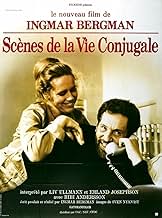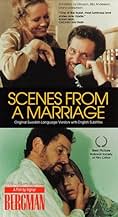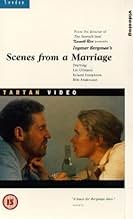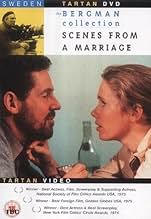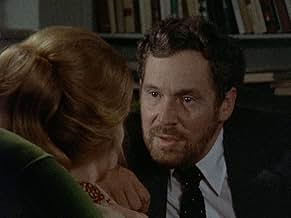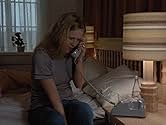Le scene di un Matrimonio raccontano i tanti anni di amore e di tumulti che legano Marianne e Johan attraverso il matrimonio, l'infedeltà, il divorzio e i partner successivi.Le scene di un Matrimonio raccontano i tanti anni di amore e di tumulti che legano Marianne e Johan attraverso il matrimonio, l'infedeltà, il divorzio e i partner successivi.Le scene di un Matrimonio raccontano i tanti anni di amore e di tumulti che legano Marianne e Johan attraverso il matrimonio, l'infedeltà, il divorzio e i partner successivi.
- Nominato ai 1 BAFTA Award
- 8 vittorie e 5 candidature totali
Recensioni in evidenza
The film can be interpreted as a sort of "When Harry met Sally" (1989, Rob Reiner) in reverse. In "When Harry met Sally" a man and a woman take a very long time finding out that they are destined for each other. In "Scenes from a marriage" a man (Johan played by Erland Josephson) and a woman (Marianne played by Liv Ullmann) take a very long time finding out that their breaking up and divorce is not the end of their relationship (and maybe not even the end of their love). When we add "Who's afraid of Virginia Woolf" (1966, Mike Nichols) to the equation we can make the following mapping:
"When Harry met Sally" is about the pre marriage phase.
"Who's afraid of Virginia Woolf" is about the marriage phase.
"Scenes from a marriage" is predominantly about the post marriage phase.
From this mapping it can be derived that in essence the naming of "Scenes from a marriage" is less fortunate.
Given the high rating the movie was a bit of a disappointment for me. I have seen better Bergman films, for example "Fanny and Alexander" (1982), also a TV mini series turned into a feature film.
The reason for the disappointment is I think the fact that in the movie the blame for the failure of the marriage is somewhat unilateral put on Johan. It is not a bad guy versus good girl movie, certainly not, but already in the first scene we see a confident Johan boasting at a journalist while Marianne is the modesty itself. Also in later scenes the man (not always Johan) is usually the one acting annoyingly. In the second scene for example Johan and Marianne are dining with a couple that starts quarilling with each other after a couple of drinks. By the way this scene owes a lot to "Who's afraid of Virginia Woolf".
Disappointing for me or not the film has had a lot of influence. Sometimes the influence is on the whole oeuvre of directors such as Woody Allen and Richard Linklater. Sometimes the influence is on specific films about failed marriages such as in "Winter sleep" (2014, Nuri Bilge Ceylan) and "Loveless" (2017, Andrey Zviagintsev).
It has all the qualities of a great Bergman film, but I just felt that the story was too mundane to be succesfully carried by Bergman's slow, dialogue heavy style for such a long runtime.
It's still really good though, and Liv Ullmann's performance alone makes it more than worth watching.
I felt the first three episodes were deep and intense. Unfortunately, the last three seemed to deacceletate, and weaken the overall impact it could of have. Almost, like it over did it with the psychological insights. Never the less even in the last episodes their were moments that seemed brilliant and tender. I am definitely glad I watched it, and personally benefited from its discussions on guilt and the issues that arise from it. I will omly add that the film serms to go beyond the question of marital happiness and seems actually about the nature of life and love itself. Just my opiniom.
Charlie, struggling with a moral dilemma at school, accompanies Colonel Slade on an unexpected trip to New York City. Throughout their journey, Slade indulges in fine dining, luxury hotels, and confronts deep emotional wounds, revealing plans to end his life. Charlie's honesty, patience, and kindness gradually draw Slade out of his bitterness. In turn, Slade helps Charlie find the courage to stand up for his principles during a critical school disciplinary hearing.
The film explores themes of honor, redemption, and personal integrity, and it features Al Pacino's iconic, Oscar-winning performance, particularly noted for the famous "Hoo-ah!" catchphrase and the unforgettable tango scene.
I liked this enough to probably give the miniseries a watch at some point, probably somewhere off in the reasonably far future though. The "short" version still felt like a full experience, and went by pretty quick considering its length.
Part of what also made this film look challenging was its subject matter and minimalist style. Being about the breakdown of a marriage and shot in a very simple way, I was worried it would get dull or boring to watch, but it kept me engaged throughout.
It's the acting and writing that really make this as good as it is, and the low-key, simple visuals really help ensure the focus is on the performances and the dialogue. I even found myself liking how stark and static the feel of the film was, as it worked well with the subject matter (a few of those quick zooms didn't look great though, but maybe the effect looked less jarring at the time).
Occasionally there was a line of dialogue that felt a little forced, but that could be as a result of the subtitles filling in gaps, due to the shorter runtime of the theatrical version. But overall, the writing is pretty strong, and I like how it focused on personal issues, thoughts, and feelings, specific to the characters, as I've found in the past that some of the broader, more overtly philosophical Bergman dialogue about "life" and "society" in general doesn't always do it for me.
But in the end, this is one of the best Bergman films I've watched so far, and between this and Smiles of a Summer Night last week, I've been really enjoying diving back into his films. I've only ever seen the theatrical version of Fanny and Alexander, but it remains my favourite film of his, so I may watch the extended miniseries version of that next, to continue this successful run of Bergman films.
Lo sapevi?
- QuizThe film was ruled ineligible for Oscar consideration because the longer mini-series version of it had already been telecast in Sweden.
- Citazioni
Marianne: Sometimes it grieves me that I've never loved anyone. I don't think I've ever been loved either. That distresses me.
Johan: Now you're being dramatic.
Marianne: Am I?
Johan: I know what I feel. I love you in my selfish way. And I think you love me in your fussy, pestering way. We love each other in an earthly and imperfect way.
- ConnessioniEdited from Scene da un matrimonio (1973)
I più visti
- How long is Scenes from a Marriage?Powered by Alexa
Dettagli
- Data di uscita
- Paese di origine
- Siti ufficiali
- Lingua
- Celebre anche come
- Scenes from a Marriage
- Luoghi delle riprese
- Fårö, Gotlands län, Svezia(island)
- Azienda produttrice
- Vedi altri crediti dell’azienda su IMDbPro
Botteghino
- Lordo in tutto il mondo
- 250 USD
- Tempo di esecuzione2 ore 49 minuti
- Colore
- Proporzioni
- 1.37 : 1
Contribuisci a questa pagina



